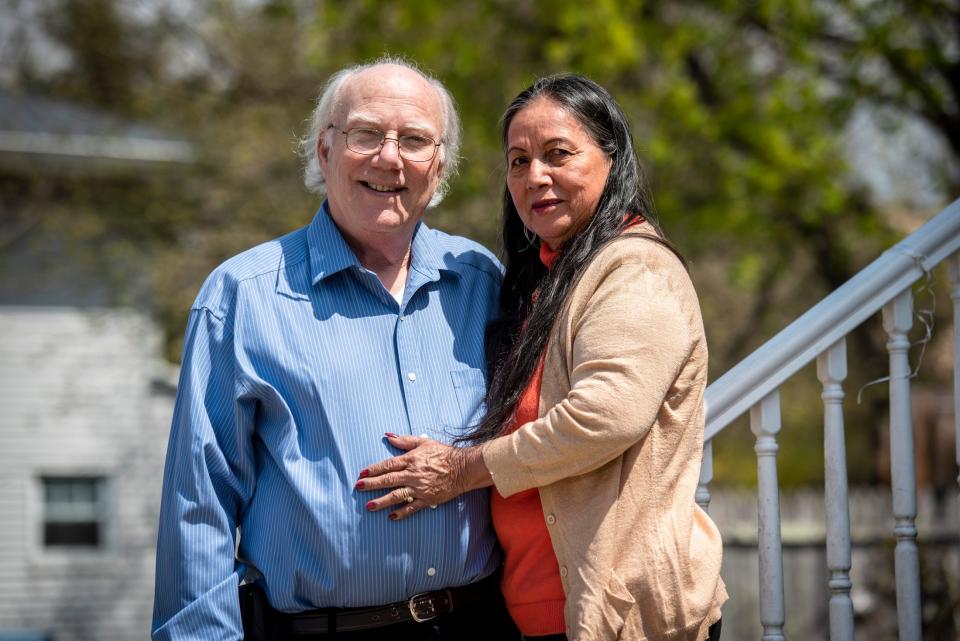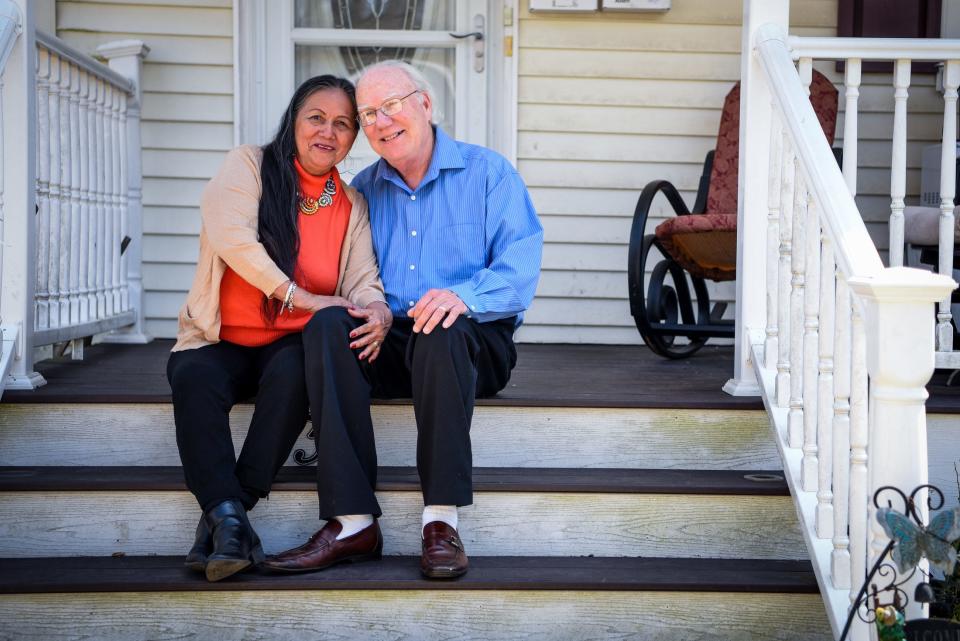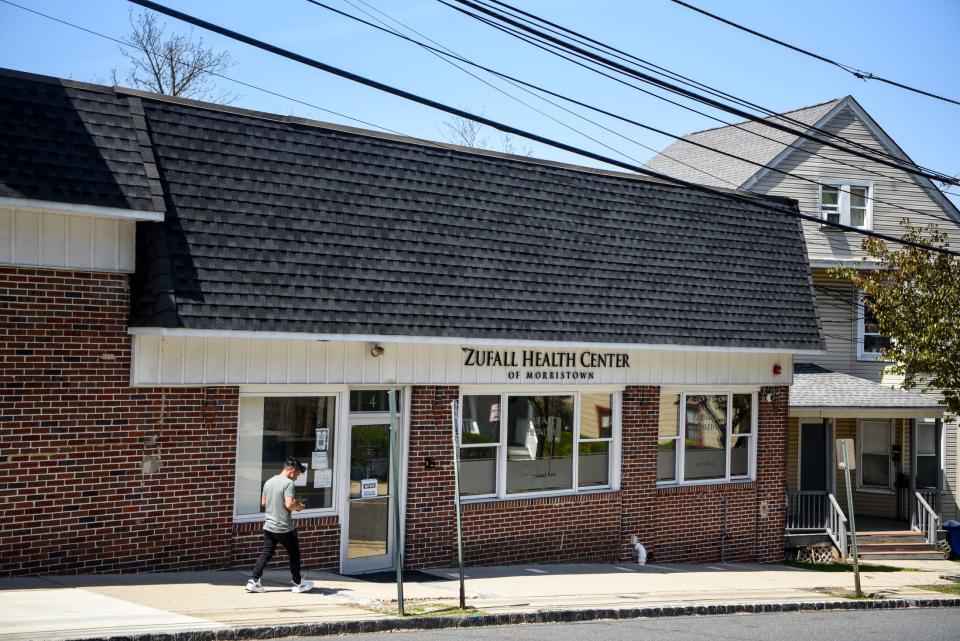Anti-viral COVID drugs are available in NJ, but the medicines are hard to get. Here's why
New anti-viral pills to treat COVID are going unused in New Jersey because eligible patients and doctors either don’t know about them or have trouble finding them. Since January, less than half of the available supplies have been used.
The two medications — Pfizer’s Paxlovid and Merck’s Lagevrio, or molnupiravir — received emergency use authorization from the federal Food and Drug Administration on Dec. 22, in the midst of the omicron surge.
They are considered an important tool to prevent hospitals from being overwhelmed with COVID patients. They are recommended for people who test positive, have symptoms of COVID and are at high risk of becoming severely ill, because they are older or have other underlying conditions. Treatment must be started within five days of symptoms appearing.
But supplies were short at first, and few patients got the medication. By the time production and distribution ramped up, omicron had waned and demand dropped.
Of the 30,520 patient courses of Paxlovid received in New Jersey so far, 11,270 — only 37% — have been reported to the state Health Department as having been used. The Biden administration unveiled a number of steps Wednesday to increase public awareness about the drugs and provide more locations for their distribution.

“It’s been hit or miss,” said Dr. Michael Cascarina, a family physician in Brick and board chair of the New Jersey Academy of Family Physicians. He has prescribed Paxlovid about a dozen times since January, and said only half of those patients have gotten it. At first, nobody could find it. Later, some patients declined treatment, felt better before they got the pills, or couldn't get the drug at their pharmacy.
“It’s hard, because it’s difficult to get,” Cascarina said. Most of the patients for whom he’s prescribed it are seniors, and if their usual pharmacy isn't stocking it, they don't want to go elsewhere.
On Tuesday, some 650 locations in New Jersey had about 18,100 five-day courses of Paxlovid available, while nearly 50,000 courses of the less effective Lagevrio were available.
The federal government ships the medications directly to hundreds of chain pharmacies in New Jersey, as well as specialized pharmacies that serve long-term care and state-run facilities, and the state provides some doses to hospitals, urgent care clinics and independent pharmacies that request it.
“We are continuously reminding our doctors that Paxlovid is available,” said Dr. Daniel Varga, chief physician executive at Hackensack Meridian Health. “Two months ago, nobody could find it. Now it's sitting on shelves in pharmacies.”
The treatment must be started soon after symptoms develop — and definitely not later than five days after symptoms first appear. For Paxlovid, shown in clinical trials to be 88% effective at preventing hospitalization, interactions with other prescription medications may rule out its use in some patients.
Mark Murphy of Rockaway and his wife, Maria Gomez, met all the conditions to take the drug in January when he came down with COVID, probably due to an exposure through his job at a parts warehouse, and passed it on to her.

The Paxlovid pills “wound up helping me quite a bit,” said Murphy, who is 66. He said his symptoms were primarily respiratory. “I felt bad, really bad. A couple of days later, I started to feel better.” Gomez, 65, whose symptoms were mostly gastrointestinal, also received Paxlovid but took longer to recover. Neither went to the hospital.
They received the treatment from Zufall Health Center in Morristown, one of four federally funded community health centers in the state to receive federal shipments of the antiviral medications.
For others, who rely on local pharmacies, the process has been more cumbersome.
Concern also has been rising that supplies will run short after Congress’ failure so far to approve President Joe Biden’s budget request for $10 billion to fight the pandemic, scaled back from $22.5 billion. Lawmakers are scheduled to take up the funding debate this week when they return to Washington.
Column: It's now mass confusion over 'mask confusion' from COVID rules
Experts warn that payments now to drugmakers are essential to keep the pipeline running for future surges.
“If we don't purchase these vaccines and therapies for the American people, other countries will," the White House COVID-19 response coordinator, Dr. Ashish Jha, wrote in a CNN opinion piece Monday. "We could find ourselves at the back of the line.”
Easier access to effective treatments like Paxlovid is critical to keeping hospitals functional and saving lives, Jha wrote. “We must keep expanding access, and getting the word out that Paxlovid is free and available.”
But in New Jersey, use of the COVID antiviral treatments has not met expectations. With the highly contagious BA.2 subvariant of the virus now infecting more people, it’s unclear whether that will change.
Many steps to get the pills
Complicating matters is America’s fractured health care system, which forces many people with COVID who would be eligible for the drugs to go through multiple steps before they can obtain them. They must navigate the complicated process while they are sick and contagious. And the goal is to start treatment as soon as possible.
For example, after a positive rapid test at home, some doctors require patients to get another test — a PCR test done by a commercial or public laboratory — before issuing a prescription for the medication. Getting to the testing site and waiting for the results adds time.
Doctors then usually require an appointment — usually via telemedicine — to verify the patient’s history, consider potential interactions with other prescription drugs they’re taking and explain the drug’s instructions and emergency status. For example, Paxlovid may not be recommended while people are taking some blood thinners.
Only then does the potentially difficult task of locating a pharmacy with Paxlovid or Lagevrio in stock begin. Not every pharmacy receives supplies from the government. And while the government has a “Therapeutics locator” website, few doctors or patients know about it.
The drugs cannot be advertised before they have full approval from the FDA; the two antiviral therapies currently have emergency use authorization.
Dr. Stephen Brunnquell, a primary care physician in Harrington Park, has prescribed Paxlovid a handful of times. While he finds a positive home test result adequate evidence of coronavirus infection in a symptomatic patient, he also wants to consult with them, usually over the phone.
“There are some interactions with these drugs where I want to be a little careful,” he said, “and aware of what else the patient is taking.”
'Test to Treat' — or not
Seeking to streamline the process, Biden used his State of the Union speech on March 1 to announce a plan for one-stop shopping to quickly get the medication into the hands of those who need it.
“The Pfizer pill reduces your chances of ending up in the hospital by 90%,” he said, noting that the government ordered millions of doses from the manufacturers. “We’re launching the “Test to Treat” initiative, so people can get tested at a pharmacy and if they prove positive can receive the antiviral pills on the spot at no cost.”
But it hasn’t worked out that way.
In the United States, pharmacists generally don’t prescribe medicine and physicians generally don’t dispense it. So even though many vaccines and COVID tests are administered at pharmacies, most pharmacies cannot give the medication without a doctor’s order. And an estimated 28% of Americans have “no usual source of care,” or no doctor.
As a result, “Test to Treat” sites have been limited mostly to CVS pharmacies or a few others with attached clinics that have a doctor or advanced-practice nurse with prescribing authority on site.
That leaves independent community pharmacies completely out in the cold, even though they may provide COVID tests and vaccines.
To fix that, some pharmacists at independent drugstores would like to be able to call a collaborating doctor to get a prescription order while a patient who has tested positive is waiting onsite.
“When you get a positive test result and the patient walks out of the facility, you want them to have the medication in their hands,” said Brian Oliveira, executive director of Garden State Pharmacy Owners, the association of independent pharmacy owners. “It's about community safety. We see it as a team effort.”
And some physicians, particularly those in large practices associated with hospitals, would like to be able to dispense the medication themselves.
“In New Jersey, physicians are prohibited from dispensing drugs,” said Brunnquell, president of the Englewood Health Physician Network. “In this particular instance, wouldn’t it make sense for a primary care physician, a pulmonary specialist or an urgent care center to have a supply on hand? ‘I’ve tested you. You need treatment. Here it is.’
“Wouldn’t that be better than looking for the website to find where there’s a pharmacy that has the medicine?” he asked.
To address some roadblocks, the White House on Wednesday announced that it plans to nearly double the number of places the drugs are available by allowing all pharmacy partners in the federal antiviral pharmacy program to order free oral antiviral treatments from the government.
The administration will also work with states to establish additional Test to Treat locations that co-locate testing, an assessment from a medical provider and oral antiviral treatments in one stop.
The administration also plans to give medical providers more guidance and tools to understand and prescribe treatments, and to ramp up public awareness and education efforts on the treatments.
One-stop shopping
Getting tested and treated was a seamless process for Murphy and Gomez at Zufall Health Center. Zufall has 10 primary health care and dental sites in Dover, Hackettstown, Morristown, Newton, Plainsboro, Somerville and West Orange. Last year it treated 41,000 patients, more than half of them uninsured.
Although it had been testing and vaccinating its patients for COVID-19, Zufall’s selection as one of 200 primary health centers across the country to receive the Paxlovid and Lagevrio antiviral pills was a stretch, said Dr. Rina Ramirez, the chief medical officer. “We had to learn about them very quickly, see how we use them and put into our process,” she said. Staff pharmacists helped with the education.
This month, federal funds to pay health care providers for COVID testing and vaccination of the uninsured ran out, however, due to Congress' failure to act on pandemic funding.
So far, about 20 of Zufall’s patients have received Paxlovid.

Murphy and Gomez called the Morristown center after the pink line appeared on the test strip of their home test kits. The center has distributed thousands of such kits to its patients, as well as others at public housing, homeless shelters and farms in the seven counties it serves, said Eva Turbiner, Zufall’s CEO.
Murphy showed his doctor a photo of the test strips, the couple’s vital signs were taken and they were given the medication. It comes in a pack, three pills to be taken twice daily for five days.
For Ramirez, it was a satisfying experience. “After seeing patients suffer with COVID for two years, it’s gratifying to be able to do something concrete — to give them medicine to help feel better, and keep them from going to the hospital,” she said.
Now, as the number of people testing positive for COVID ticks up again, she encourages patients with a positive result to contact their health care providers. Don’t wait, she said, because the window to begin treatment is short.
“If you test positive at home, give us a call,” she said. “We might have something to help you with it.”
Lindy Washburn is a senior health care reporter for NorthJersey.com. To keep up-to-date about how changes in health care affect you and your family, please subscribe or activate your digital account today.
Email: washburn@northjersey.com
Twitter: @lindywa
This article originally appeared on NorthJersey.com: Anti-viral drugs for COVID are available in NJ, but hard to get

